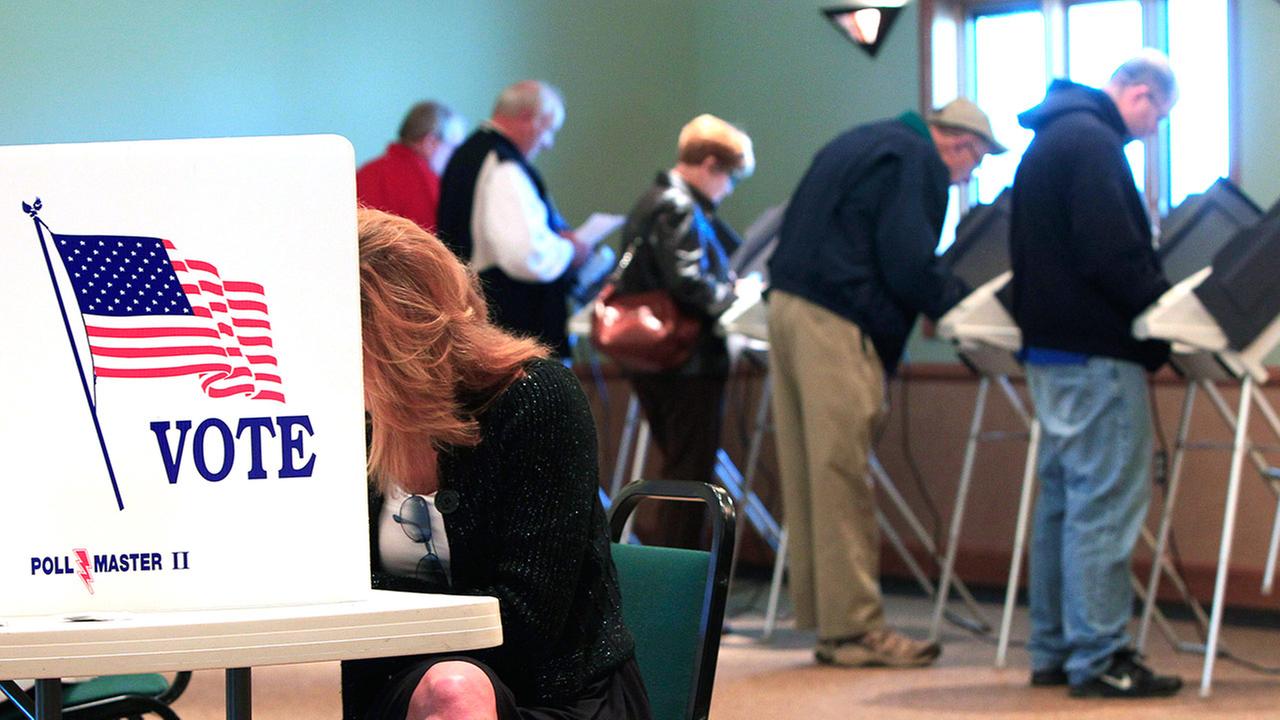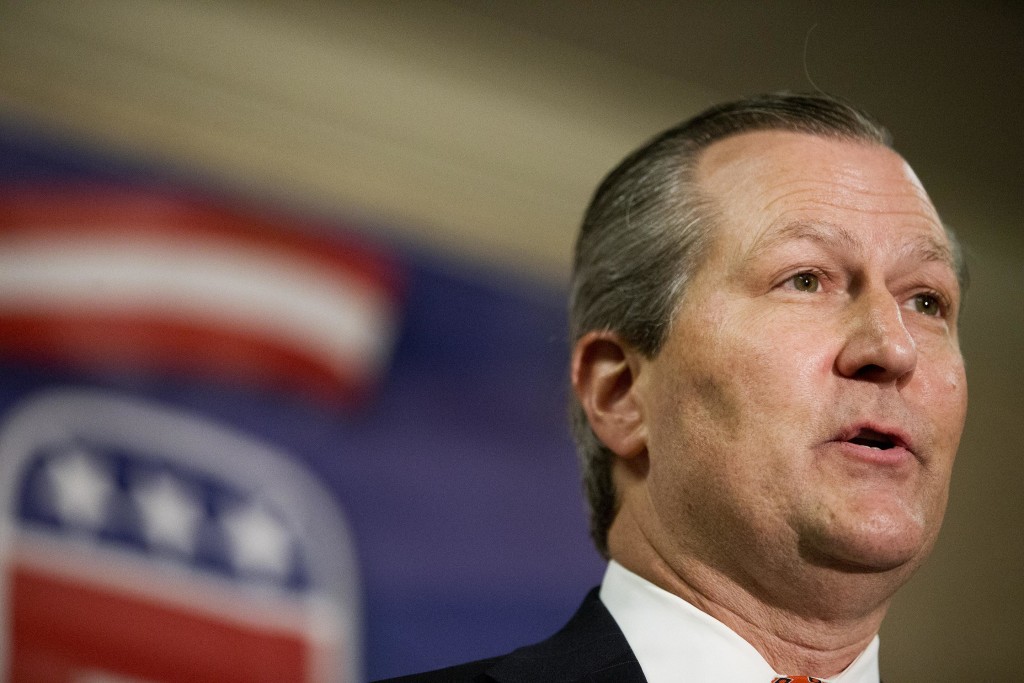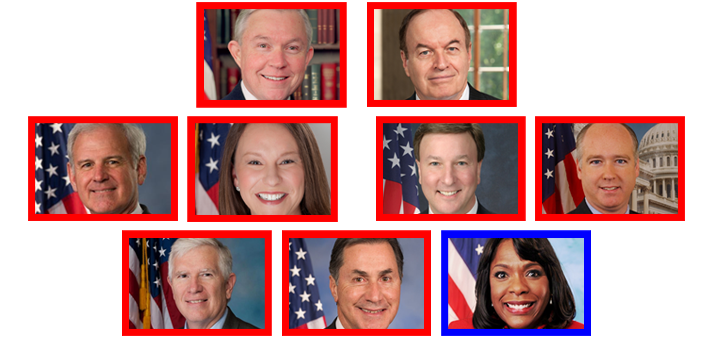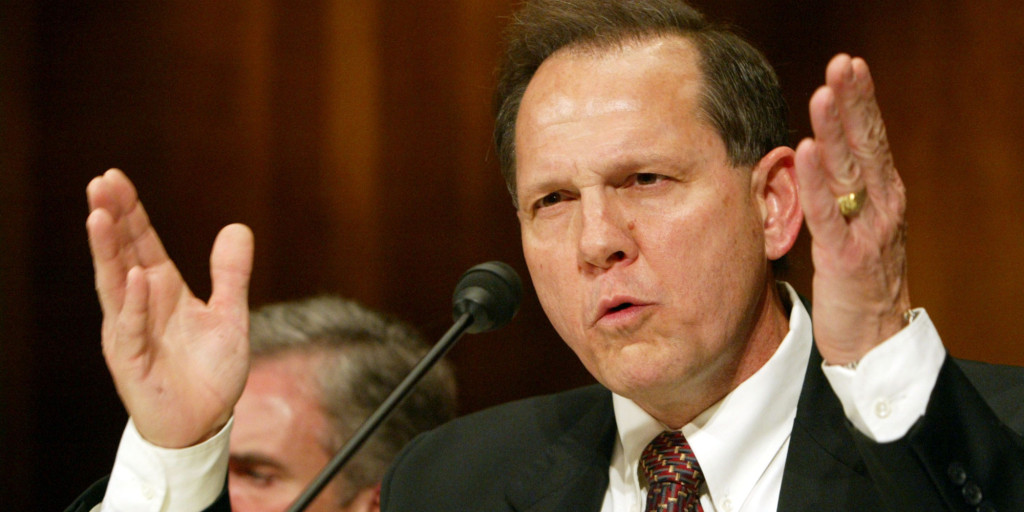Angi Stalnaker: The political tool of mass destruction

Political rhetoric can be a dangerous weapon, especially when the rhetoric is antithetical to logic and reason. It can become a tool of mass destruction when irrational political rhetoric becomes the basis for a movement and begins to influence the way in which people cast ballots in Congress or in their local ballot boxes. I have never seen rhetoric become as potentially dangerous as it is with the anti-incumbency movement. What was once a tool used by a few political newcomers as a wedge issue has now evolved into a machine that has convinced people that anyone that they have elected before is now, for some unexplainable reason, a bad person that must be sent packing. Apparently, victory in politics is now the ultimate sin within the ever growing anti-establishment movement. It no longer matters how well you served your constituents. It no longer matters how solid your views are on the issues or how consistent your voting record was. It no longer matters what you did while you serving as an elected official. The only thing that matters is that you won your last election and that is the offense for which you should be tarred and feathered. I understand that there are politicians that have lied and reversed their positions on key issues. I am all too aware that there are politicians that have not turned out to be the person that they were on the campaign trail. I recognize that sometimes a politician turns out to be a bad person that should have never gotten elected in the first place. Sometimes, elected officials need to be voted out and replaced with someone better. I get it. What I don’t get is why we would want to vote out elected officials who have been champions for their districts. Why cast a ballot against a Senator or Congressman or County Commissioner that has done everything that they promised they would do when you voted for them the first time? Why are we banishing Mayors and City Councilman who have made their towns better places? I just don’t get it. Conservatives seem to be leading the anti-incumbency charge when we should actually be the ones shouting the loudest to stop this lunacy. Remember, the last time America decided to vote against the conservative establishment in favor of a relative unknown, we got President Barack Obama. Let’s all take a deep breath and pause for a few minutes before we decide to perpetuate the myth that incumbency is a sin or we may end up making a huge mistake and replacing the few good people who keep DC from going completely off the rails. As your grandmother probably told you, the grass is not always greener on the other side of the fence, especially when that fence is around a government building. Angi Stalnaker is an Alabama native who, as a political consultant, has worked on numerous statewide, legislative and constitutional amendment races for conservative causes and candidates. For more information about her visit Virtus Solutions.
Shelby County to vote on Sunday alcohol sales on March 1

Residents in one of Alabama’s most populous counties will decide whether to allow Sunday alcohol sales. Shelby County is set to vote on the alcohol referendum during the primary election on March 1. The county is one of the largest in the state with more than 200,000 residents just south of Birmingham. Baptist leader Joe Godfrey tells WBMA-TV that the Alabama Citizens Action Program will work with area clergymen to defeat the measure. But business managers and some elected leaders say Sunday sales are needed to help generate revenue. Pelham City Council President Rick Hayes says the lack of Sunday sales affects economic growth. And restaurant manager Jessica McKay of The Coal Yard in Helena says the venue could open for business on Sundays if voters approve the referendum. Republished with permission of the Associated Press.
Judge to hold hearing in Mike Hubbard ethics case

Lawyers in the ethics case against Alabama House Speaker Mike Hubbard are headed to court for the first time since Hubbard’s lead defense lawyer asked to withdraw from the case. Circuit Judge Jacob Walker indicated he plans to discuss any issues caused by the departure during a hearing Friday in Opelika. Those discussions could include if Hubbard’s March 28 trial should be postponed. Hubbard’s defense also wants to question lead prosecutor Matt Hart after Hart sent a copy of the withdrawal motion to a reporter while it was still under seal. The attorney general’s office says Hart didn’t realize the document was under seal and has since apologized. Hubbard is accused of using his office to benefit his clients and businesses. His defense argues the transactions were legal. Republished with permission of the Associated Press.
Yeas and Nays – How the Alabama delegation voted this week: 1/8/16

Here’s a look at how the Alabama delegation voted on major issues this week in the U.S. House of Representatives. The U.S. Senate was not in session this week. House votes H.R. 3762: the Restoring Americans’ Healthcare Freedom Reconciliation Act. The bill repeals or significantly modifies numerous major provisions of Obamacare, including repeals of the individual and employer mandates, tax subsidies for individuals to purchase health insurance from exchanges, the expansion of Medicaid, and the Prevention and Public Health Fund. It also effectively eliminates more than a dozen taxes included in the law, including the medical device tax, the “Cadillac” tax, the net investment tax, and the additional Medicare tax. Finally it blocks federal funding for Planned Parenthood for one year and provides alternative women’s health funding for community health centers. Passed the House 240-181. Yea: Rep. Bradley Byrne (AL-01); Rep. Martha Roby (AL-02); Rep. Mike Rogers (AL-03); Rep. Robert Aderholt (AL-04); Rep. Mo Brooks (AL-05); Rep. Gary Palmer (AL-06) Nay: Rep. Terri Sewell (AL-07) H.R. 1155: the Searching for and Cutting Regulations That Are Unnecessarily Burdensome (SCRUB) Act. The bill establishes a nine-member commission to review existing federal regulations and identify those that should be repealed in order to reduce costs on the U.S. economy — including those that should be immediately repealed and those that should be repealed over time through a new regulatory “Cut-Go” system under which agencies could not issue new rules unless the cost of a new rule was offset by repealing existing rules identified by the commission. Passed the House 245-174. Yea: Rep. Bradley Byrne (AL-01); Rep. Martha Roby (AL-02); Rep. Mike Rogers (AL-03); Rep. Robert Aderholt (AL-04); Rep. Mo Brooks (AL-05); Rep. Gary Palmer (AL-06) Nay: Rep. Terri Sewell (AL-07) H.R. 712: the Sunshine for Regulatory Decrees and Settlements Act. The bill requires the federal government to provide advance public notice when it plans to enter into discussions regarding consent decree or settlement agreement, and allows affected third parties to intervene in that process. It also requires federal agencies to file monthly status reports of their rule-making activities and requires that a 100-word summary of each proposed rule be posted online, along with the proposed rule itself. Passed the House 244-173. Yea: Rep. Bradley Byrne (AL-01); Rep. Martha Roby (AL-02); Rep. Mike Rogers (AL-03); Rep. Robert Aderholt (AL-04); Rep. Mo Brooks (AL-05); Rep. Gary Palmer (AL-06) Nay: Rep. Terri Sewell (AL-07) H.R. 1927: the Fairness in Class Action Litigation and Furthering Asbestos Claim Transparency Act. The bill prohibits federal courts from certifying proposed classes of individuals for a class action lawsuit unless each member of the class has suffered the same type and degree of injury. Passed the House 211-188. Yea: Rep. Bradley Byrne (AL-01); Rep. Martha Roby (AL-02); Rep. Mike Rogers (AL-03); Rep. Robert Aderholt (AL-04); Rep. Mo Brooks (AL-05); Rep. Gary Palmer (AL-06) Nay: Rep. Terri Sewell (AL-07)
5 things you need to know about Barack Obama’s gun control town hall

President Barack Obama took the stage at George Mason University in Fairfax, Va. Thursday night for a rare interactive, town hall style debate on gun control. Attended by 100 invitation-only partisans, the “Guns in America” debate was broadcast live on CNN only two days after Obama announced “a series of common-sense executive actions” to reduce gun violence. There, the 75 minute forum gave the President, who has made gun control a main issue in his last calendar year in office, an opportunity to make his case for gun control reform to households in red and blue states across the country. Here are five things you should know from the 75-minute town hall: America remains divided Of the first five questions the President fielded, three came from gun rights advocates — a rape survivor, a sheriff, and the widow of American Sniper Chris Kyle — whose stories brought emotional authenticity to the stage all in support of maintaining their Second Amendment rights. “Celebrate that we’re good people and 99.9 percent of us aren’t going to kill anyone,” Taya Kyle, widow of former Navy SEAL Chris Kyle, whose story and consequently death by firearm at the hands of a mentally unstable man, was the foundation of the blockbuster movie “American Sniper,” told the President. Kyle penned an editorial earlier in the day saying stricter gun control “won’t protect us.”Obama acknowledged later in the evening that Americans are simply coming from different places in the gun debate: “Part of the reason, I think, that this ends up being such a difficult issue is because people occupy different realities.” Obama’s frustration was palpable From the beginning, the President was clearly flustered. “Our position is consistently mischaracterized,” he said. He was sure to note that the pro-gun National Rifle Association had declined an invitation to the event — according to CNN, the NRA called the town hall “a public relations spectacle orchestrated by the White House — saying, “I’m happy to meet with them … But the conversation has to be based on facts and the truth and what we are proposing, not some imaginary fiction that Obama is trying to take away your guns.” When questioned whether he was conspiring to confiscate guns, Obama became instantaneously angry snapping at the forum’s host, CNN anchor Anderson Cooper. “Part of the challenge in this is that the gun debate gets wrapped up in broader debates about whether the federal government is oppressive, and there are conspiracy theories floating around the Internet these days all the time,” Obama said, Obama recognized some of his limitations When asked about changing the way Americans register for guns Obama responded, “That’s an area where there’s just not enough national consensus at this stage to even consider it. And part of it is people’s concern that that becomes a prelude to taking people’s guns away. Part of the challenge of this is that the gun debate gets wrapped up in broader debates about whether the federal government is oppressive and there are conspiracy theories floating around the Internet these days all the time.” Later to another audience member he addressed his limitations to making sweeping changes, replying, “This is not a proposal to solve every problem. It is a modest way of us getting started on improving the prospects of young men and young women like you the same way we try to improve all the other aspects of our lives.” Obama called on Congress to help The President called on Congress to set up a system that is “efficient” and doesn’t inconvenience lawful gun owners to create a background check system to curb illegal gun activity. “The fact that the system doesn’t catch every single person … has to be weighed against the fact that we might be able to save a whole bunch of families from the grief that some of the people in this audience have had to go through,” the President said. Obama got emotional When CNN played footage from earlier this week of the President shedding tears over the Sandy Hook Elementary School mass shooting, which left 20 children and 6 adults dead, the President admitted it was the most difficult time of his presidency. “It’s the first time I ever saw Secret Service cry,” he recalled. “It continues to haunt me.”
Robert Bentley refugee lawsuit unlikely to gain traction

If past is prologue in his legal battles with the feds, the lawsuit filed Thursday by Gov. Robert Bentley alleging the Obama administration’s noncompliance with the Refugee Act of 1980 isn’t likely to bring the president to his knees. Bentley claims, on behalf of the state of Alabama, federal officials are in violation of the law for not consulting with the states on the placement of refugees from war-torn Syria as provided for in the law. U.S. Supreme Court precedent has held repeatedly that matters of immigration and asylum are the responsibility of the federal government. If this sounds familiar, you may have in mind Bentley’s first tussle with the Obama administration on Syrian refugees, where he joined two dozen Republican governors in declaring they would not accept Syrian asylum-seekers within their states’ borders. It soon became clear, however, governors have no authority to nullify presidential actions on immigration or to pick and choose which refugees they will accept. In light of this some state leaders, such as Georgia Gov. Nathan Deal, have rescinded their orders halting refugee resettlement on the advice of legal counsel and in the face of the plain facts of federalism. Not Bentley. His first run-in with the feds was in 2011, when federal judges struck down a bill intended to curb illegal immigration from Mexico. Bentley had vowed to “fight at every turn to defend this law against any and all challenges,” but the law remains off the books. Bentley joins Chief Justice Roy Moore in thumbing his nose at Washington, D.C., from a high perch in Montgomery. Moore ordered 68 probate judges to stop issuing marriage licenses to same-sex couples, citing uncertainty in the law, though the U.S. Supreme Court was unequivocal that such laws shall be issued in its 2015 Obergefell v. Hodges decision. “This complaint has no legal merit, and the state of Alabama has no authority under the Constitution to block the settlement of refugees,” said Southern Poverty Law Center senior supervising attorney Kristi Graunke. Or as Wayne Flynt, a former Auburn University history professor, put it: “We arbitrated these issues between 1861 and 1865.” Information from The Associated Press was used in this report.
Roy Moore denies defying U.S. Supreme Court

Alabama Chief Justice Roy Moore – ousted from office a decade ago when he refused to remove a Ten Commandments monument from state property – on Thursday stood by his assertion that Alabama probate judges should not issue marriage licenses to gay couples, a seemingly direct challenge to a U.S. Supreme Court ruling that effectively legalized same-sex marriages nationwide. Moore’s stance first appeared on Wednesday in an administrative order; he reiterated his position Thursday in an interview with The Associated Press. “Until further clarification, (the probate judges) are bound by state law,” Moore said. His order on Wednesday and his remarks on Thursday drew immediate condemnation from civil and gay rights organizations and from a legal advocacy group, which filed a complaint against him with a state commission that investigates judicial misconduct. His critics promptly suggested that he should be removed from the bench again for his refusal to accept the U.S. Supreme Court’s decision six months after it was handed down. Some of the judges who stopped issuing licenses Wednesday immediately after Moore’s order, meanwhile, resumed the service Thursday after consulting with attorneys. In his order, Moore noted that the Alabama Supreme Court has not lifted a March 3 ruling prohibiting probate judges from issuing licenses to gay couples. He said it’s up to the state court to decide what to do with that order following the U.S. Supreme Court’s decision. Moore insisted Thursday that he is not defying the high court, but seeking to resolve what he says are lingering questions about the impact of the federal decision. He said he issued the order Wednesday because “there’s a lot of confusion out there among probate judges about what to do.” “Some are issuing same-sex marriage licenses, some are not, some are issuing no marriage licenses at all.” Two federal prosecutors in Alabama, however, said on Wednesday that there should be no confusion, because the U.S. Supreme Court ruling trumps whatever the state court has to say on gay marriage. Other Legal experts interviewed by the AP agreed. Richard Cohen, president of the Montgomery-based legal advocacy group the Southern Poverty Law Center, said Moore should be removed from office – again. “You know back in 2003 he was kicked out of office for violating a federal court order,” Cohen said. “This time he’s urging 68 probate judges to violate the federal court order that was entered by the district court in Mobile. He’s also asking them to ignore the ruling of the United States Supreme Court.” The center – which sued Moore over the Ten Commandment monument – filed an ethics complaint to the state’s judicial inquiry commission last year after Moore publicly criticized a federal judge’s ruling overturning Alabama’s same-sex marriage ban. The advocacy group filed a supplement to that complaint on Wednesday, saying Moore has violated the canons of judicial ethics by refusing to respect the U.S. Supreme Court’s decision. The court has not acted on the earlier complaint filed by the SPLC. Alabama Judicial Inquiry Commission Executive Director Jenny Garrett said she couldn’t comment specifically on Moore, but that any potential sanctions for a judge accused of misconduct would be imposed if the commission filed charges in the court of the judiciary and the court found the judge to have committed ethics violations. All proceedings before the commission are confidential and don’t become public until they move to the court of the judiciary, Garrett said. Sanctions the court could impose on a judge include removal from office, suspension without pay, censure and more, Garrett said. Wayne Flynt, a former Auburn University history professor, said Moore’s tactics echo Southern states’ resistance to federal school desegregation orders long after the segregation had been ruled illegal. “We arbitrated these issues between 1861 and 1865,” Flynt said of the Civil War conflict that determined who has the final say, states or the federal government. Regardless of his stance, Moore’s order did not appear to have widespread impact. Probate judges in Lawrence and Madison counties who had stopped issuing all marriage licenses in response to Moore’s order Wednesday said they had resumed the service Thursday after consulting with attorneys. Mobile County said licensing operations would resume on Friday. Republished with permission of the Associated Press.
Gallup: Jeb Bush’s image among Republicans declines

Jeb Bush’s image among Republicans has worsened, according to a new Gallup poll. Forty-five percent of Republicans and Republican-leaning independents said they had an unfavorable opinion of the former Florida governor. The results reflect voters opinions between Dec. 18 and Jan. 5. That support, the poll found, is significantly lower than his position in July, when 54 percent of Republicans and Republican-leaning independents said they had a favorable opinion of Bush. Frank Newport of gallup.com reported that Bush’s -1 net favorable rating is the “worst of any major GOP candidate – lower than John Kasich’s +5, and well below seven other GOP candidates Gallup is tracking.” Ted Cruz tops the list during the two-week period, with 61 percent of Republicans and Republican-leaning independents saying they had a favorable opinion of the Texas senator. Cruz has a +45 net favorable rating. Marco Rubio has a +35 net favorable rating, with 55 percent of people saying they had a favorable view of the Florida senator during the two-week period. He came in third in Gallup’s net favorable rankings, ahead of Ben Carson, who has a +40 net favorable rating. Carly Fiorina, Donald Trump and Chris Christie all have net favorable ratings in the +23 to +25 range. Bush went from being the presumed front-runner to lagging in the polls. National polling averages show he is in sixth place, with 3.3 percent support. Trump continues to lead the pack, national polling averages show, with 35.3 percent support. Bush has spent a considerable amount of time in early voting states in recent weeks as he tries to gain momentum in advance of the country’s first primaries. The Iowa caucuses are Feb. 1; the New Hampshire primary follows a week later, on Feb. 9.
Marco Rubio talks football in new 60-second spot

Marco Rubio is talking football in a new campaign ad hitting the airwaves this weekend. In the 60-second ad — dubbed “Football” and set to air during the NFL Playoffs in some markets in early voting states — Rubio catches footballs and fields questions. “More nervous before first presidential debate or first college football game,” an announcer asks Rubio. “I was more nervous before my first college football game, because you were actually going to get hit,” the former football player responds. Later the announcer asks: “Most important preparation for a big game or big speech?” “Make sure there is water nearby — like right now,” the presidential hopeful responds as he catches a bottle of water. National polling averages compiled by RealClearPolitics show Rubio is in third place in national polls, behind Donald Trump and Sen. Ted Cruz. He’s in third place in Iowa, but is in second in New Hampshire, trailing Trump.


